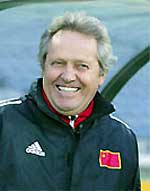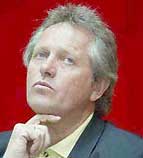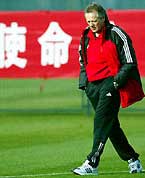Arie Haan 阿里•汉
[ 2004-02-24 16:24 ]
 Arie Haan 阿里·汉 Arie Haan 阿里·汉
Position: head coach
Date of birth: 16/11/1948
Birthplace: Netherlands
Arie Haan: We can make it to Germany 2006
Dutchman Arie Haan was chosen to replace Bora Milutinovic as China’s national
team coach late 2002. In a rare interview, Haan spoke to FIFA.com about his
new job, expectations for Germany 2006 and one of the greatest goals in FIFA
World Cup history.
FIFA.com: What attracted you to the China job?
Haan: First of all, I prefer coaching a national team to a club team.
After last year’s World Cup, a number of countries contacted me regarding
positions. I had a think and in mid-October last year, I got in touch with the
Chinese Football Association. Two months of negotiating later, I signed a
contract with the CFA. I’m pleased that it worked out and I’m very glad to be
China’s coach. Coaching the world’s most populous country is likely to be both
challenging and very interesting.
Before you took up the position, how familiar were you with Chinese
football?
 To be perfectly frank, I knew very little about Chinese
football. I had watched the China-Brazil and China-Turkey games during last
year’s World Cup but precious little else. To be perfectly frank, I knew very little about Chinese
football. I had watched the China-Brazil and China-Turkey games during last
year’s World Cup but precious little else.
What impression did you have of China during those two games?
I was particularly struck by the players’ courage competing against some of
the best teams in the world and also witnessed some skill. It was their
first-ever finals performance, so I will not judge them too harshly.
Having coached at German Bundesliga club Stuttgart and Dutch side
Feyenoord, will you favour a Dutch or German style with China?
I am a Dutch guy, so, of course, I favour the Dutch style. In Holland,
football has developed very well and our style is pretty good.
Your start has been positive with a draw against world champions Brazil
(0-0) and a win against Estonia (1-0). What do you see as the team’s strengths
and weaknesses?
My players’ performance against Brazil surprised me. A draw against the world
champions was a very good result which we can build on. And in the following
game against Estonia, the team won despite two of our more experienced players -
Li Tie and Sun Jihai – having returned to Everton and Manchester City.
Generally speaking, Chinese players have good football skills. They are
also strong and speedy. However, there are many aspects they can improve on –
the mental side, vision, and positional play to name a few. They also need to be
deadlier – more lethal - in front of goal. So Chinese players should pay more
attention to their positions?
 Absolutely right! Football is a team game, and everyone on
the pitch has their own position and job to do. The best chance of winning is
when every player performs his personal job on the pitch well. Absolutely right! Football is a team game, and everyone on
the pitch has their own position and job to do. The best chance of winning is
when every player performs his personal job on the pitch well.
Your compatriot Guus Hiddink led Korea Republic to the semi-finals of a
FIFA World Cup and is now a god-like figure in Korea. Have you been in contact
with him for any tips?
No, we’ve had no discussion on that subject.
What will you borrow from Hiddink’s “pressure game” that he utilised so
effectively at last year’s FIFA World Cup?
Hiddink achieved wonders during that tournament, but there are many
differences between China and Korea in terms of football styles and player
physique. Hiddink and I are also different people, and everyone has their own
particular way of doing things.
Your predecessor Bora Milutinovic was pretty popular with fans after
leading China to their first ever finals. Do you feel under any pressure to
achieve results quickly?
No, I don’t. A football coach is under pressure at any level, be it at a club
side fighting relegation or as the coach of the world’s most populous nation.
The most important thing is not to complain about pressure, but know how to
handle it.
How tough will it be to qualify for Germany 2006?
That depends on many things. There is still a long way to go, and our rivals
could be Korea, Japan, Saudi Arabia or Iran, who are all strong teams. The most
important thing is to prepare fully as, in this area at least, we are pretty
much our own masters. But whoever we face in qualifying, I am very confident we
can make it.
How would you describe the passion for football in China?
Football is very much in the hearts of the Chinese people. It brings joy,
tears and much debate here. Whatever they do, they do for football.
How important is the success of the Chinese premier league for the
national team?
Very. A strong, well-run league is crucial to the national team’s
improvement. Footballers can only progress by playing competitive matches, and a
high-level league will provide such games.
Would you advise Chinese players to go abroad to gain more
experience?
Why not? A player will learn more and improve in an altogether new and good
football environment. Whichever team you join, be it Manchester United or Bayern
Munich, a player is sure to progress because he is rubbing shoulders with the
best in the world and can only learn from the experience. Competing to earn your
position in the team helps mould a player.
What have been the main difficulties that you have experienced in the
job?
The biggest handicap has been the lack of matches. Since I took up the job,
we have played just those two games against Brazil and Estonia. We are training,
and these sessions are good for players, but they need competitive games to gain
experience and exposure. You can only learn from mistakes and they must find out
what their mistakes are by playing competitive games.
To what extent has communication been a problem? How do you talk to your
players?
Fortunately I have a very good interpreter, so there is no difficulty for me
to communicate with the players. My interpreter knows the players very well and
this has been helpful. A few of them speak a little English. Shao Jiayi, who
plays with Bundesliga side 1860 Munich, speaks some German and we can converse
in that language too.
What are the main differences between pre-match preparations in Europe
and in China - training, food habits, team training camp etc?
There are many differences. For instance, the food here is very different
from that in Europe. I think European food may be too rich for Chinese players.
The most important thing is not the type of food, but if it can help players
keep up their strength and nutrition.
Have you got used to Chinese food?
I am quite familiar with Chinese food from the many restaurants in Holland. I
like it a lot.
Chinese medicine is often practised in Asia. How do you regard it when it
comes to injuries?
The medicine that can keep my players fit and healthy is the best medicine,
no matter what it is.
It has been argued that with the high emphasis on club football, many of
the traditional footballing nations no longer have the same passion and
competitive attitude for international football. Do you think this is true and
may have been a factor in the last FIFA World Cup, which had so many surprise
results?
Yes, we can see that from last year’s world cup, where many Italian and
Argentinian players were tired. Nowadays, players are professional and they play
to make a living for the clubs who pay them. The league games today are hard and
competitive, and they have little energy left over to play for their national
team. Time, as well as strength to prepare properly for tournaments, is
something that needs to be resolved.
You scored one of the greatest goals in FIFA World Cup history with your
long-range strike against Italy at Argentina 78. Dino Zoff spoke to
FIFAworldcup.com about it before Korea/Japan 2002 saying such wonder goals were
exceptional in 1978, but are commonplace today. Looking back on it, how would
you describe the moment?
It was beautiful, particularly after I had scored a similar goal from
distance against Germany in the previous game. I remember I picked up a pass,
ran five metres with the ball, and saw a chance of a shot. So I did, and the
ball found the net.
You beat the best goalkeeper from long range. Did you feel it was the
best goal ever?
(Laughing) No, I know there are many fantastic goals in World Cup history,
like Maradona’s against England in 1986, and Saeed Al Owairan for Saudi Arabia
in 1994. But scoring against Dino Zoff, a great goalkeeper from a country famous
for brilliant keepers, is really a beautiful moment to recall.
|
